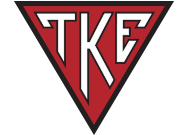The History of Tau Kappa Epsilon Fraternity
From our founding in 1899 to our recent milestones, explore the history that shaped one of the most respected fraternities in the world. Our timeline highlights the pivotal moments, leaders, and events that have shaped TKE into the organization it is today, with each chapter of our story reflecting our enduring values of Love, Charity, and Esteem.

Founding & Formation
TKE began at Illinois Wesleyan University with a bold idea: judge men by character, not rank or wealth. From a local society, it quickly found its voice, embraced “Opportunity Out of Defeat,” and moved from petitioning others to becoming a national fraternity in its own right.
1899: Founded as the Knights of Classic Lore at IWU; first constitution drafted by the five Founders.
1902: Adopted the name Tau Kappa Epsilon while securing its first house (the Wilder Mansion).
1907–1909: Wallace G. McCauley’s “Opportunity Out of Defeat” spurs a new direction; national constitution adopted and first Conclave convened (1909).
1909 & 1912: Early expansion—Beta (Millikin) and Gamma (Illinois)—“completing the triangle,” now a core symbol of TKE.
1921: The horseshoe tradition begins; original horseshoe later lost during WWII and rediscovered decades after.
Resilience & Brotherhood
Through Depression-era headwinds and wartime disruption, TKE consolidated strength, formalized expansion practices, and grew across new regions.
1935: Merger with Sigma Mu Sigma adds new members and establishes the Alpha-Pi chapter at George Washington University.
1939: TKE creates a formal colonization process to standardize growth before chapter installation.
1946: Expansion into the Deep South as five Alpha Lambda Tau chapters affiliate with TKE.
WWII era: The original Conclave horseshoe is lost amid wartime years (later recovered).
Growth & Inclusion
The post-war years brought infrastructure and visibility: a headquarters of our own, an expanding publication footprint, and continued emphasis on character-based membership with no exclusionary clause.
1956: TKE opens its first TKE-owned headquarters building (“El Rancho”).
1960: Executive leadership transition and IHQ relocation strengthen operations.
1960s: Editorial stewardship of The Teke continues, reflecting a growing, nationwide fraternity.
Standing principle: TKE’s long-held commitment to no discriminatory clause continues to distinguish the Fraternity.
1969: The Lettermen record the “Sweetheart of T.K.E.” adding cultural resonance to TKE traditions.
Building Better Men
Education and philanthropy take center stage as TKE invests in member development and deepens its service impact.
1971: TKE begins its enduring partnership with St. Jude Children’s Research Hospital (launching with an IU homecoming fundraiser).
1983: President Ronald Reagan establishes the Ronald Reagan Leadership Award to honor outstanding collegiate Tekes.
By the late ’80s: The Charles R. Walgreen, Jr. Leadership Academy is taking shape as a flagship, annual leadership experience (24th annual by 2010).
Modern Brotherhood
Responding to changing times, TKE modernizes education and operations, enhances risk management, and reinvigorates communications.
Late 1980s–1990s: Grand Chapter eliminates traditional pledging and adopts structured candidate education and Membership Quality Boards.
1991: Auxiliary “Little Sisters” programs are abolished, aligning practice with values and policy.
1990s → 1999: The Teke magazine, suspended during the decade, is re-established in 1999.
Early 2000s: TKE upgrades infrastructure and staffing, improving chapter size, philanthropy, and service metrics.
Fraternity for Life
TKE scales its impact—especially through St. Jude—while embracing digital tools and a global alumni network to support Tekes for life.
2008–2011: Partnership with St. Jude renewed; TKE meets $1M pledge early to name an MRI suite.
2012–2018: A second commitment ($2.6M) to name the Proton Therapy Synchrotron is met nearly three years early.
2019: New $10M in 10 years commitment; St. Jude names the Bone Marrow Transplant & Cellular Therapy Research floor in recognition.
2020–2021: COVID-19 pandemic. With campuses closed and in-person activities limited, TKE rapidly pivots to virtual programming, online recruitment and education, and remote Province Forums/RLC experiences—keeping members engaged, supported, and connected.
Today: One of the largest fraternities, TKE continues to emphasize a Fraternity for Life with hundreds of active groups and 300K+ lifetime members.
